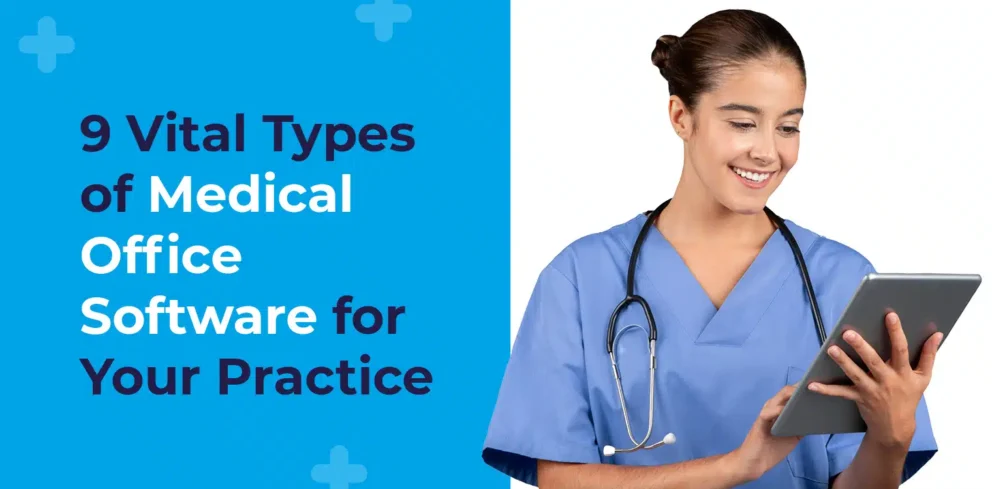10+ Top EHR Software Providers for Detailed Records in 2026

An electronic health record (EHR) software solution significantly impacts patient care, administrative burden, and clinical intelligence. The right software stores valuable patient data, helping providers make informed decisions about patient care. To determine what to look for in an EHR software provider and how to choose a solution that meets your needs, you’ll need to review:
With the right solution, you’ll take better encounter notes, deliver a better patient experience, and keep your patients healthy and happy.
Best EHR Software Solutions
1.  PracticeSuite
PracticeSuite
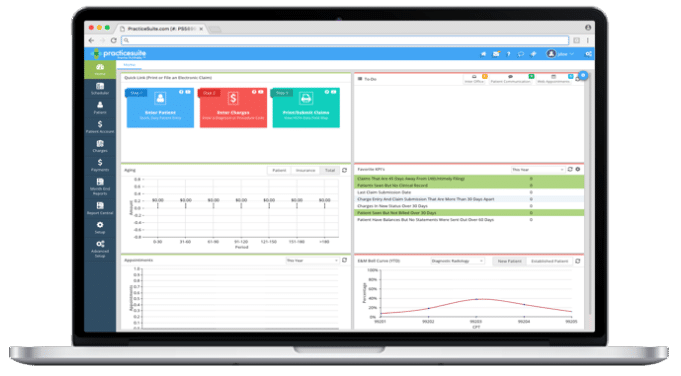
If you’re looking for a single solution that meets all your needs, look no further than PracticeSuite. PracticeSuite is a comprehensive software offering many different features and solutions, including EHR. We offer over 60 EHR software specialties, so you’re certain to find one that fits your needs.
Our tools include:
- Customizable and flexible charting: Document the way you want with customizable charting workflows. Choose from multiple documentation styles, from point-and-click to voice recognition. Plus, take patient notes on any device, including desktops, laptops, and tablets, with efficient single-screen charting.
- Integrated electronic labs: Diagnose patients faster with direct electronic connections with leading providers of laboratory services. Submit, assign, and view labs and orders directly in PracticeSuite’s EHR software.
- Accurate and safe e-Prescribing: Accurately and safely prescribe medications to over 70,000 pharmacies nationwide with real-time electronic prior authorizations, prescription benefits, and enhanced medical reconciliation.
- Clinical dashboards: Quickly view your patients’ most important healthcare data in one place. Customize dashboards to set the view you need to deliver accurate diagnoses and treat patients effectively.
Our enterprise-level, single-source software provides everything you need in one system. With over 20 years of experience in the industry, we deliver robust tools that meet the needs of medical practices nationwide. In addition to EHR capabilities, we offer practice management, telehealth, medical billing, process automation, revenue cycle management (RCM), and more. To top it off, you can contact customer service through live chat, call, or email at any time.
To get more information on pricing, get in touch with us today!
2.  MicroMD
MicroMD
If you’re looking for a simple and customizable healthcare information platform, MicroMD is the EHR solution for you. This provider offers solutions for the pre-visit, visit, and post-visit, including medical records that improve clinical productivity and enhance patient care.
Their EHR software features include:
- Multiple clinical documentation methods, from text templates to SOAP templates to Encounter Wizards
- Image annotation on pictures, clinical images, and anatomical diagrams
- Specialized EMR features for various medical specialties, including cardiology, dermatology, and ENT
Contact MicroMD’s team for pricing information. You can also ask about bundling their practice management and EHR tools together.
3.  DrChrono
DrChrono
DrChrono is an EHR platform that adapts to your practice’s needs, providing mobility and accessibility from anywhere, at any time. This native iPad solution allows you to spend more time interacting with your patients and less time on the computer. They’re dedicated to offering innovative solutions that empower you to provide healthcare on demand.
Their top features include:
- Custom vitals to establish baseline health data for patients
- Free drawing and annotation on photos and diagrams
- Customizable medical templates for your specific needs
Reach out to DrChrono for an EHR pricing quote.
4.  NextGen Healthcare
NextGen Healthcare
NextGen Healthcare is dedicated to providing EHR and EMR software that delivers better healthcare outcomes for all by improving the quality of patient care and helping clinicians create a healthy work-life balance. They’ve achieved high ratings for their EHR tools in many specialties, including cardiology, multispecialty clinics, neurosurgery, pulmonary medicine, and more.
Their top features include:
- NextGen Office Ambient Assist, which securely converts spoken patient-provider conversation into a structured SOAP note
- Intuitive workflows that reduce time on documentation
- Professional support from project managers, consultants, technical personnel, and more
Pricing for NextGen Healthcare’s solutions varies depending on which solutions you’re looking for. Contact their team for a quote.
5.  athenahealth
athenahealth
athenahealth offers athenaOne, a healthcare solution that enables clinical and operational efficiency. They’re rated by customers as a great solution for small practices of 2-10 physicians, offering simplified documentation, more complete patient records, and compliant solutions.
In their EHR software, they offer:
- Real-time patient insights
- Care coordination support
- Specialty-specific workflows
- Mobile documentation
Request a demo or contact the athenahealth team for pricing information.
6.  CureMD
CureMD
CureMD’s AI-powered platform enables you to focus on exceptional patient outcomes. Their EHR is user-friendly and customizable, and it integrates with practice management solutions for optimized quality, performance, and patient experience. It’s built for usability, performance, and reliability—you can instantly connect with patients, payers, labs, hospitals, and other entities to deliver better care.
Their top features include:
- Complete access to patient data, including notes, medical histories, and other documents
- Workflow automation, from KPI dashboards to enterprise scheduling
- Interoperability, enabling connections with patients, hospital networks, referring providers, and more
Connect with the CureMD team for pricing information.
7.  CareCloud
CareCloud
CareCloud’s cloud-based EHR and EMR system is intuitive, secure, and customizable to meet your practice’s unique needs. Their solution transforms the way you practice by improving the quality, efficiency, and safety of your healthcare delivery.
Some of CareCloud’s EHR tools include:
- Flexible charting, from customizable templates to order sets and charting options
- Real-time intelligence to enhance decision-making and patient safety
- Advanced reporting tools that simplify quality initiative tracking, MACRA compliance, and population health management
Book a demo or connect with the CareCloud team for pricing information.
8.  Practice Fusion
Practice Fusion
Practice Fusion is the EHR that helps independent practices thrive. Their system helps medical practices save time by delivering templates and patient charts in a cloud-based EHR that adapts to their needs.
Their standout features include:
- Charting on any device, including laptops, tablets, and mobile phones
- Free patient portal for a seamless patient experience
- Library of customizable charting templates
Practice Fusion starts at $199 a month for its EHR software, which includes three signing staff licenses and unlimited non-signing staff licenses. You can also sign up for a free trial to test if the solution works for your unique needs.
9.  eClinicalWorks
eClinicalWorks
eClinicalWorks is the largest cloud-based EHR software in the US. Their EHR tools harness the power of AI to modernize healthcare delivery with comprehensive documentation, enhanced interoperability, and industry-leading value and satisfaction. They offer solutions tailored to various healthcare specialties, including dental, vision, behavioral health, ambulatory surgery, and urgent care.
What sets eClinicalWorks apart from its competitors is its integrations with AI tools:
- Sunoh.ai: Leverage AI to turn conversations between providers and patients into draft notes.
- AI Assistant: A conversational AI tool that streamlines workflows from scheduling to developing care plans.
- Image AI: Better manage your fax inbox and reduce the burden of manually analyzing the faxes you receive each week.
- Automated Playlists: Use multi-screen navigation to reduce time spent on repetitive, manual tasks and identify and close gaps in care and coding.
For EHR only, eClinicalWorks charges $449 per month per provider. If you’re interested in bundling their EHR software with their other tools, you can expect this cost to increase.
10.  Oracle Health
Oracle Health
Previously known as Cerner, Oracle Health offers EHR and EMR software capabilities as part of its clinical suite. Their solution is designed to transform EHRs from a source of documentation to a single complete source of patient information. They bring a wealth of experience and a deep understanding of healthcare, making them a stellar choice for your EHR needs.
Oracle Health’s best EHR features include:
- Complete interoperability between systems and venues of care
- Population management tools that enable value-based care
- EHR system performance monitoring, from performance to configuration to clinician workflow efficiency
Reach out to Oracle Health’s team for more information about pricing.
11.  MEDITECH
MEDITECH
MEDITECH is an intelligent EHR platform that helps your medical practice maintain a continuum of patient care. Their software focuses on data, including interoperable exchange across multiple settings, enriched information for advanced clinical decision-making, and seamless discrete data flow. With this solution, you can manage every step of the patient journey and provide more person-centered care.
MEDITECH Expanse is a web-based platform that boasts the following key features:
- Traverse, which enables free-flowing information and solution interoperability for a holistic view of patient medical histories
- Surveillance, which uses predictive analytics to support proactive care
- Genomics, which gives providers access to patient DNA data and the insights that come with that information
MEDITECH’s pricing is customized to each organization’s specific needs and requirements—connect with their team today to get a quote.
12.  Veradigm
Veradigm
Veradigm is a provider dedicated to empowering its clients with trusted data, insights, and solutions to reduce costs and improve health outcomes. It offers many solutions and services, from gap closure to risk adjustment analytics to provider engagement tools. One of its offerings is EHR software.
This provider’s top EHR features include:
- One-click templates that automatically populate patient information based on previous visits or conditions.
- RAF and risk scores that you can view directly within the EHR, facilitating informed decision-making.
- Care plans and goals that you can create, define, and track for each patient to improve their outcomes.
To explore Veradigm’s EHR software pricing, contact the provider to get a demo and quote.
13.  ModMed
ModMed
ModMed is a specialty-specific EHR software provider. Their cloud-based software is designed to improve clinical workflows so physicians can get back to doing what they love—treating patients. They work with specialties including gastroenterology, OBGYN, ophthalmology, and more.
Here are a few of their top EHR features:
- Auto-suggested notes and coding, including E/M, CPT, and modifier codes that simplify physician encounters
- Integrated MIPS functionality and dashboards for performance tracking
- AI tools that go beyond SOAP note transcription to suggest specific visit note content that helps you complete downstream clinical tasks like prescriptions and handouts
If you’re interested in working with ModMed, contact their team for pricing information.
14.  PrognoCIS
PrognoCIS
PrognoCIS is a cloud-based, HIPAA-compliant medical office software that empowers healthcare providers to conduct value-based care. They serve all types of medical practices, from solo practitioners to enterprises to multi-specialty practices. Their EHR software is designed to harmonize with your workflow and smooth out all the kinks.
Here are a few of their top features:
- Documentation: PrognoCIS offers custom templates, smart phrases, and specialty-specific progress notes.
- e-Prescribing: Electronically prescribed controlled substances in real-time. Receive drug alerts, federal drug access, and more.
- Integrated billing solution: Simplify auto-generated claims, electronic submission, and billing reporting for more optimized revenue management.
To learn more about PrognoCIS’s pricing, contact their team for a quote.
15.  Praxis EMR
Praxis EMR
Praxis EMR is a medical tool that gives you the freedom to practice medicine in your way, no matter your medical specialty. Most notably, Praxis doesn’t offer templates in its EHR solution and instead prioritizes flexible charting that doesn’t impair healthcare quality.
Some of Praxis’s top EHR software features include:
- Integrated patient-provider portal that enables seamless communication and tailors health maintenance content to each patient’s condition.
- Powerful queries that streamline MACRA and PQRS reporting, revolutionizing your practice with customized population management and health maintenance.
- PraxDocs document manager, which provides comprehensive scanning, imaging, and archiving features that allow you to go paperless.
For version nine of Praxis EMR, you can expect to pay $219 a month for 60 months for one provider, or $259 for 48 months. Adding additional providers is discounted.
EHR Software FAQs
Now that we’ve discussed the top providers, let’s take a look at some frequently asked questions about EHRs.
What is an EHR System?
According to HealthIT, EHRs (or electronic health records) are real-time, patient-centered digital records that make information available instantly and securely to authorized users. This makes them highly accessible for providers, especially those who work at multi-location practices.
While EHR software solutions contain patient medical and treatment histories, they do more than that. They offer various features that give providers a broader view of a patient’s care. In addition to specific patient records, providers can also access tools that simplify and automate their workflows, empowering them to make informed decisions regarding patient care and take quick action.
What’s the Difference Between EHR and EMR?
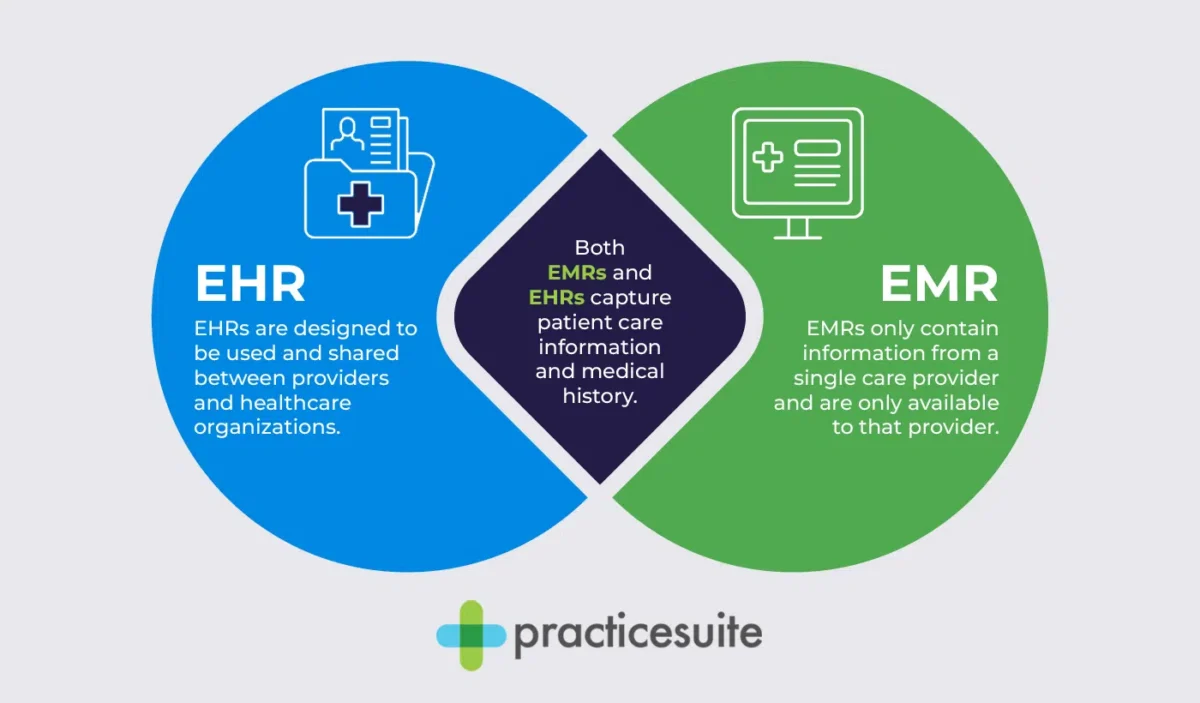
An electronic medical record (EMR) is very similar to an EHR in that it captures patient care information and medical history. However, EMRs only include information from a single care provider and are only available to that provider. EHRs, on the other hand, are designed to be used and shared between providers and healthcare organizations.
If you’re choosing between EMR and EHR software, consider which will provide the best view of patient data. EHRs give you a more holistic view of your patients’ well-being, ensuring that you make informed decisions regarding their care. And if you ever have to refer a patient to another practice or healthcare entity, sharing their EHR is simple.
What Are the Key Benefits of Using EHRs?
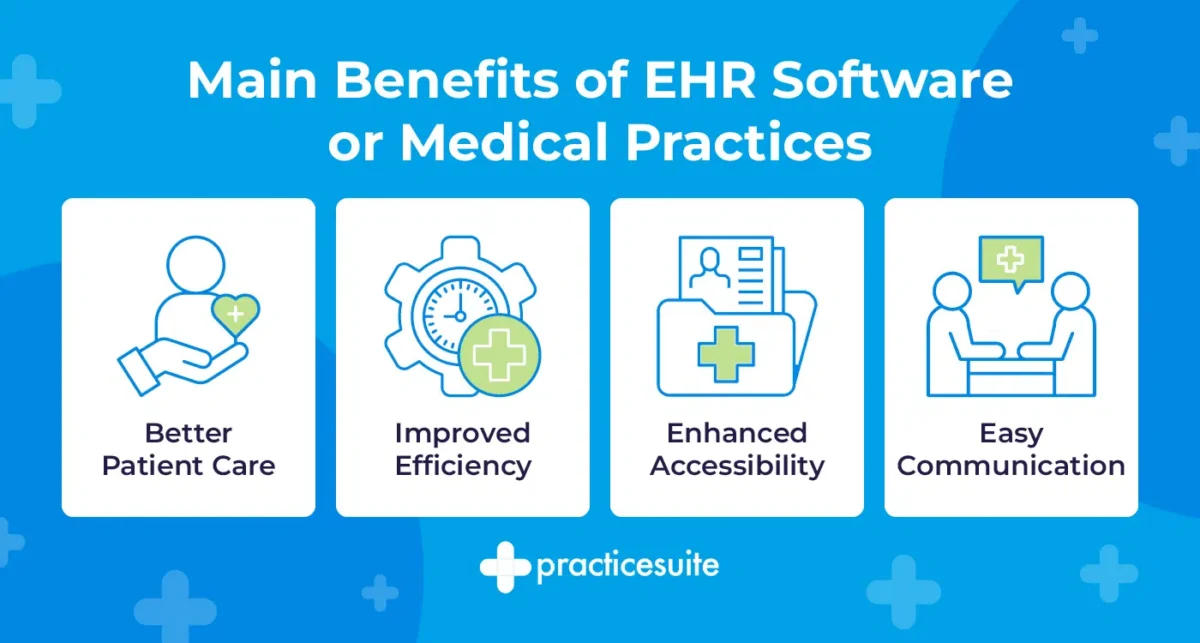
Here are some of the main benefits of using EMR and EHR software at your medical practice:
- Better patient care. With EHRs, you’ll have access to complete patient medical histories, including everything from allergies to medications to family histories. With all this information at your fingertips, you can make informed decisions about patient care that consider their well-being from a holistic standpoint.
- Improved efficiency. Say goodbye to manual note-taking on pen and paper. A digital, cloud-based EHR system makes it easy to chart on any device and update patient records conveniently, improving your practice’s overall efficiency.
- Enhanced accessibility. Authorized staff members can access patient records as long as they have an internet connection. Plus, you can easily share patient records with other providers, laboratories, hospitals, and other healthcare entities who need them.
- Easy communication. Healthcare entities can easily collaborate by sharing EHRs and sending requests for tests and medications through secure channels. And, empower patients to engage with their healthcare by taking their well-being into their own hands. EHR software includes patient portals with integrated messaging, allowing patients to reach out directly to their medical providers.
Overall, an EHR system makes everything easier for medical providers, their patients, and other healthcare entities. Because of these benefits, a comprehensive EMR and EHR solution is often well worth the investment.
What EHR Features Should I Look For?
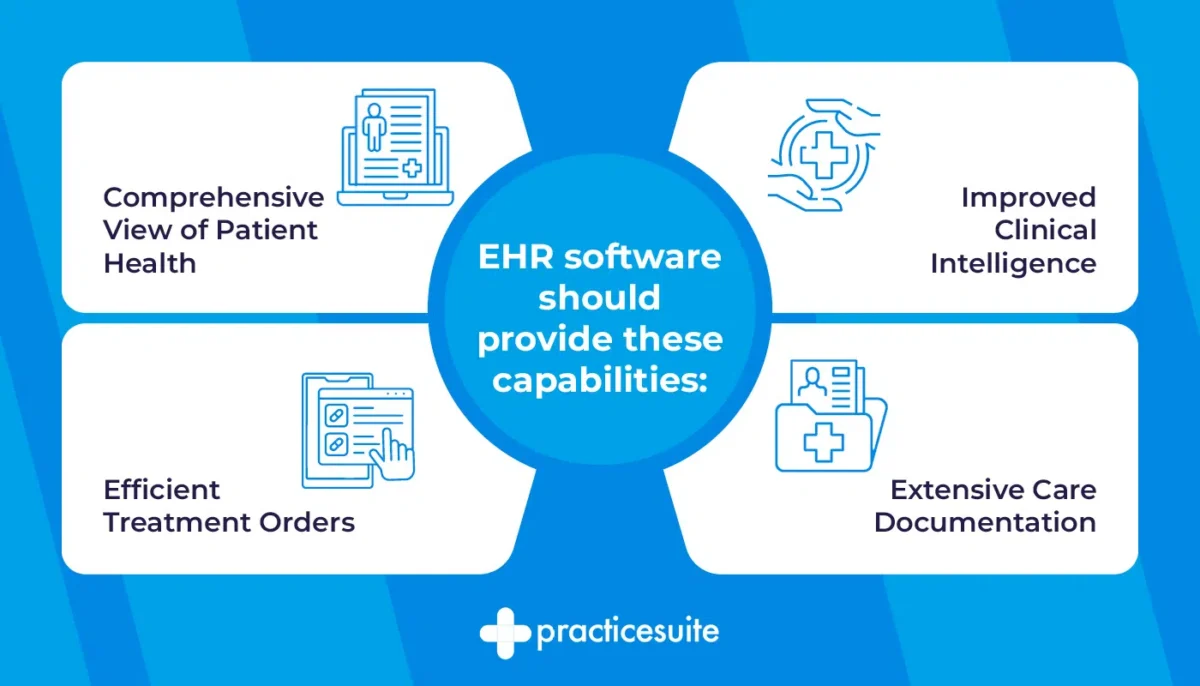
The best EHR software will give clinical staff four essential capabilities:
- Comprehensive view of patient health. With clinical staff responsible for hundreds, if not thousands, of patients each year, your software must provide an organized, familiar way for clinical staff to quickly understand the wellness and care plans for each unique patient. The best EMR and EHR systems provide sophisticated at-a-glance chart views that give clinical staff an overview of a patient’s medical history.
- Efficient treatment orders. The bulk of the action derived from a patient visit is executed through ordering medications, tests, procedures, follow-up appointments, and more. These actions are often fulfilled by various entities, internal and external to the practice. Your EHR software must be flexible, documenting the treatment plan and communicating those details to all relevant entities easily and accurately.
- Improved clinical intelligence. With the amount of clinical information contained within an EMR, it’s only reasonable to expect the best EHR software to help clinical staff avoid duplications, errors, and adverse interactions as they document care and order treatment. Your solution should include intelligence alerts like reasonable vital sign ranges, gender-specific diagnoses, and age-specific qualifiers. It should also assess the likelihood of interactions such as medication duplication, adverse reactions, and allergic reactions.
- Extensive care documentation. Each patient encounter has to be documented, but not every encounter will contain the same type of information. A robust EMR and EHR software solution gives clinical flexibility to document a range of patient visits, from standard visits—such as physicals, recurring care management visits, and telehealth appointments—to seriously complex, multi-problem patient encounters.
When evaluating the best EMR or EHR software for your practice, you must consider how the prospective software will help you accomplish the four critical roles outlined above. Additionally, make sure the solution you decide on complies with HIPAA and other rules and regulations surrounding data privacy and the protection of health information.
Additional Resources
A robust EHR software solution makes patient care easier and more accurate than ever before. If you’re looking for a way to boost patient satisfaction and deliver better care, look no further than these solutions.
Ideally, you should invest in an all-in-one system that includes other tools for medical practices, such as practice management and medical billing. For an intuitive, seamless, and comprehensive solution that combines EMR and EHR software with a wide range of other medical functionalities, look no further than PracticeSuite.
Interested in other forms of medical software? Take a look at these resources:
- Electronic Health Records. Check out PracticeSuite’s top-of-the-line EHR software, built with a physician’s workflows in mind.
- 20+ Best Medical Billing Software Solutions.Revenue is essential to keeping your practice open and profitable. Discover the top medical billing software solutions here.
- 9 Top Medical Practice Management Software Features. Optimizing your practice goes beyond EHRs. Explore the top features practice management software can offer.

